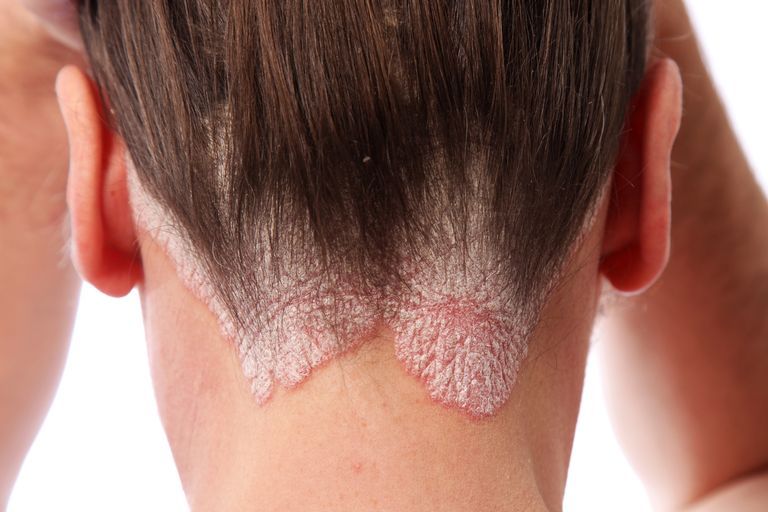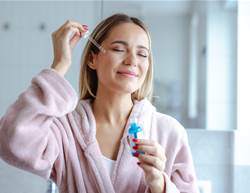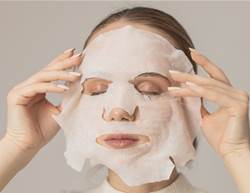For most people struggling with an itchy scalp or dandruff, switching shampoos is enough to find relief. But for those with scalp psoriasis-a type of psoriasis that forms on the top of the head and can also spread to the top of the forehead, the back of the neck, and behind the ears-it’s not always so simple.
Scalp psoriasis typically appears as pink/red patches and silvery scales that may be accompanied by itching, soreness, or a burning sensation. The more severe it is, the more likely you'll feel the crusty plaques on your head-and maybe even see them fall off if you scratch them. Scratching can also make the scalp bleed and cause temporary hair loss. As you can imagine, scalp psoriasis is a condition that can make some people feel embarrassed.

Most patients with scalp psoriasis also have psoriasis on other areas of their body, and symptoms can flare up and recede over time. For instance, they're often worse in the winter months and whenever you're feeling stressed.
Just like with other types of psoriasis, it's not clear what the cause of scalp psoriasis is and, unfortunately, there is no cure. But here's the good news: There are plenty of safe and effective treatments that can help you find significant relief.
Shampoos and solutions
Dandruff shampoos might help a very mild case of scalp psoriasis. "Anything beyond a little scaling will require a prescriptive agent," says says dermatologist Dr Bobby Buka.
There are several types of prescription-strength shampoos that your doctor might suggest. In the past, tar-based shampoos were often used, but they smell lousy and can stain things, so many dermatologists are moving away from those now. Dermatologist Dr Rhonda Q. Klein will typically prescribe a zinc or selenium sulfide shampoo and have the patient rotate that with a steroid shampoo, or sometimes she'll recommend an antifungal.
About 50% of people with psoriasis get it on their scalp.
How often do you need to use a prescription shampoo? "There are patients that start off using one every day and after several weeks to months, they may only need it once every two weeks or once a month," says Dr Buka.
But there are some caveats. "It's really important to take a thorough history of people's hair-washing behaviours to figure out what the best topical treatment will be," says Dr Klein. For instance, some women don't wash their hair every day, so for them, putting a solution in their hair at night two or three times a week, sleeping in it, and then washing their hair the next morning may be a better option.
Oral medications
If topical treatments aren't providing enough relief, a dermatologist may move on to a systemic treatment. There are pills that you can take, usually twice a day, to treat scalp psoriasis. One that is commonly prescribed is called apremilast.
Another option for some patients is acitretin, a vitamin-A derivative, but it can't be used in women with childbearing potential because you can't get pregnant within three years of taking it.
Other drugs like methotrexate and cyclosporine may also be considered, though they can have serious side effects. "With methotrexate, you can have liver issues and cyclosporine can affect the kidneys and blood pressure," says Dr Klein.
Light or laser therapy
You can go to a dermatologist's office two or three times a week to receive what's called narrow-band UVB phototherapy. (They don't use full-spectrum light that contains UVA rays because that would increase your risk for skin cancer.) It feels a lot like going to a tanning salon-you step into a vertical box that's filled with lights. "You don't really see maximum benefit until 10 to 12 weeks and many patients continue to do it for six months," says Dr. Klein. "There are also home light box units that we try to get insurance to cover." Light therapy is generally a good choice if you have scalp psoriasis as well as psoriasis on other areas of your body.
 Another variation: "You can get a comb with a light in it, so you can essentially brush with this light turned on that emits UVB rays," says Dr Buka. "That's one way to suppress inflammation on the scalp without using a steroid."
Another variation: "You can get a comb with a light in it, so you can essentially brush with this light turned on that emits UVB rays," says Dr Buka. "That's one way to suppress inflammation on the scalp without using a steroid."
There's also an excimer laser, which is a form of ultraviolet laser and can be used in a doctor's office two to three times a week. "This works great for the scalp because it's more of a targeted therapy and we actually put the lasers in the areas where we see the plaques," says Dr Klein.
Biologics
"Biologic therapy is the hottest thing to hit dermatology and psoriasis in the last three years," says Dr. Buka. It's basically a shot that a patient can give to herself every three months at home, so it's the most convenient option. It's typically used only if the psoriasis is covering a large percentage of the body or if the patient also has psoriatic arthritis. "Biologics are very safe and the success rate is in the 80% to 90% range," says Dr. Buka. The downside is that they can be super expensive, so it's a good idea to check with your insurance provider ahead of time to see what your out-of-pocket cost would be.
Home remedies
If you're interested in trying home remedies, always talk to your dermatologist first to make sure they're safe. As for their effectiveness, some home remedies might help a little, especially if you have a mild case of scalp psoriasis. But you will likely need something stronger and clinically proven to find major relief.
"There's definitely great anecdotal evidence for acupuncture use. There's great anecdotal evidence about some Chinese herb use. Do I think that could clear an entire scalp? No. Do I think it could make a significant improvement on a scalp? Yeah," says Dr Buka. "I think someone that was dedicated to meditation, massage, stress reduction, and acupuncture could probably get 50% improvement on their psoriasis, but not clear."
(Want to pick up some healthier habits? Sign up for FREE to get healthy living tips, weight loss inspiration, slimming recipes and more delivered straight to your inbox!)







.jpg&h=193&w=250&c=1&s=1)


